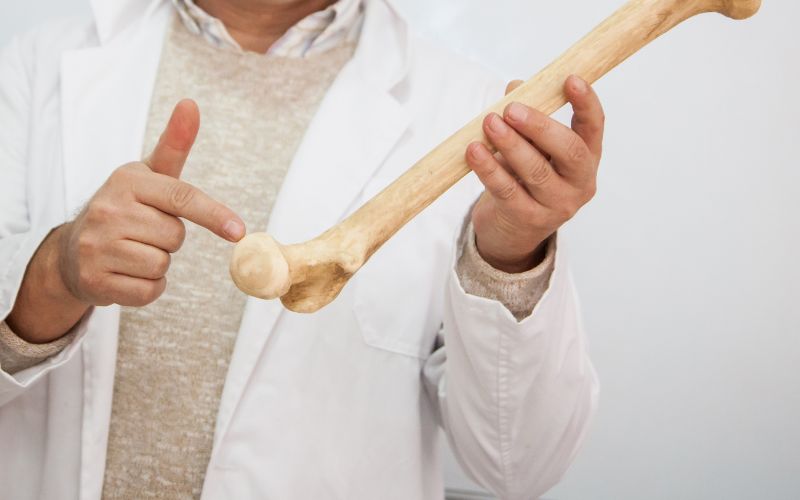
The Importance of Bone Health at Every Stage
Keeping bones healthy and strong is essential for overall health. Bones hold the body together, shelter internal organs, and enable us to move about. Bone care is even more significant to avoid fractures, osteoporosis, and loss of bone mobility as we get old.
Bone health is often neglected until a problem arises. But if we take good care of our bones at a young age, many complications later on can be avoided.
Unlock joint support now at Vital Earth Minerals!
Nutrition and Bone Health
What we consume directly influences the density and strength of our bones. A healthy diet in childhood, teen years, and adulthood is a foundation for a lifetime of healthy bones.
Calcium and Vitamin D
Calcium is the most critical bone-strengthening mineral, and a deficiency of calcium can lead to various bone problems. Calcium contributes to building and maintaining healthy bones. Good sources of calcium include milk, cheese, yogurt, leafy green vegetables, and fortified cereals.
Vitamin D is one of the best vitamins for bone health; it assists the body in more efficiently absorbing calcium. Sunlight is a natural source, but sunlight can also be achieved through fatty fish such as salmon, egg yolks, and fortified food. Daily exposure of 10-30 minutes of your skin to sunlight can assist in meeting your needs.
Protein Intake
Protein maintains bone structure and density. Seek a balanced diet from sources such as lean meat, dairy, legumes, and nuts. Excessive protein without sufficient calcium may lead to a loss of calcium in urine. A balanced diet rich in protein is particularly important for older adults to avoid muscle and bone loss.
Other Essential Nutrients
Magnesium, phosphorus, zinc, and vitamin K also play a vital role in bone development. A proper diet includes plenty of fruits, vegetables, whole grains, and lean proteins. These foods provide essential nutrients. You can find good sources in leafy greens, seeds, nuts, and whole grains. Make these part of your daily meals.
Symptoms of Bone Weakness
Bone weakness can develop quietly, but it has signs that should not be overlooked. Catching them early prevents more advanced bone issues.
Look out for these signs of possible bone health problems:
- Frequent breaks or fractures from minor falls
- Loss of height over time
- Back or neck pain
- Slumped posture
- Brittle nails or receding gums
- Weak grip strength

These signs might start as subtle, but they can indicate worsening bone health. If you notice any of these symptoms, schedule a bone density test or consult a doctor.
Risk Factors for Poor Bone Health
Knowing the bone health risk factors allows you to take preventive measures to safeguard your bones.
1. Age and Gender
Women are more likely to develop osteoporosis and joint problems during pregnancy and after menopause. This is because their estrogen levels drop. Additionally, bone mass decreases with age.
2. Family History
If osteoporosis or bone fractures are common in your family, you are more likely to be at risk. Understanding your family's medical history is helpful in early prevention.
3. Lifestyle Habits
Smoking, excessive alcohol intake, poor diet, and a sedentary lifestyle all contribute to weak bones. Making small positive changes in your daily life routine can have a big impact over time.
4. Medical Conditions and Medications
Some health issues can weaken bones. These include rheumatoid arthritis, celiac disease, and hormonal disorders. Taking corticosteroids for an extended period can also weaken bones.
Tips to Improve Bone Health
It does not take drastic changes to enhance bone health. With regular lifestyle practices, you can develop and sustain better bones at any age.
1. Follow a Balanced Diet with Calcium and Vitamin D
Ensure you consume a lot of dairy products, leafy vegetables, and fortified foods as part of your regular meals. Pair them up with sunlight or supplements for Vitamin D. You may get a consultation from a nutritionist regarding a bone-conducive meal plan.
2. Regular Exercise
Resistance and weight-bearing exercises are ideal for bone density. Exercise walking, jogging, dancing, or lifting weights a minimum of 3–4 times per week to activate bone formation. Even squats and lunges with body weight will do.
3. Quit Smoking and Alcohol
Smoking reduces bone density, and too much alcohol can disrupt the balance of body calcium. Cutting or ending these behaviors greatly improves bone health. Both habits are the major cause of bone weakness and upset the balance of bone-forming cells.
4. Have a healthy weight
Being underweight can increase the risk of losing bone strength and getting fractures. Eating a healthy diet and exercising regularly can help you maintain a healthy weight, which supports stronger bones. Obesity can also lead to bone stress and joint problems, so aim for a balanced body mass index (BMI).
5. Consider Bone Density Testing
If you're over age 50 or have other risk factors for osteoporosis, talk to your doctor about getting a bone density scan. The earlier the condition is detected, the more effective the treatment and prevention. They are brief, non-surgical, and extremely informative tests.
6. Reduce Caffeine and Soda
Excessive caffeine or soda use can lower calcium absorption. Attempt to substitute these with water, milk, or calcium-containing drinks. Green tea or herbal infusions are better options.
7. Exercise Every Day
Even simple activities, such as walking, stretching, and gardening, can help. The key is to avoid prolonged inactivity, which can weaken bones over time. Regular movement keeps bones stimulated and muscles strong.
8. Ensure Proper Sleep
A lack of quality sleep can increase stress hormone levels and contribute to insomnia, potentially leading to a negative impact on bone density. Aim for 7–9 hours of quality sleep each night to help your body repair and regenerate.
9. Monitor Hormonal Changes
Hormonal deficiencies, especially in women going through menopause, can influence bone density. Discuss hormone replacement therapy or natural supplements if necessary.
10. Add Omega-3 Fatty Acids
Omega-3s, contained in fish such as salmon and walnuts, possess anti-inflammatory properties that might contribute to bone health. They might also slow down bone loss in older individuals.
Conclusion
Bone health is an investment for life. With proper diet, exercise, and healthy habits, we can develop and retain healthy bones well into old age. Don't wait for trouble to begin; act now to safeguard your bones and enhance your quality of life.
Prevention is better than a cure. Through making conscious daily choices, you can have a more active, mobile, and pain-free life in your old age.
Frequently Asked Questions
At what age should I take care of my bones first?
Bone health must be maintained from childhood, but it's never too early or too late. The sooner you start, the healthier your bones will be when you are older.
How much calcium should I have every day?
Adults usually require around 1,000–1,200 mg of calcium per day, and this varies by age and sex. Check with your physician for customized advice.
Does exercise build stronger bones?
Yes! Weight-bearing and resistance exercises are shown to build stronger bones and avoid bone loss.
Do you need supplements for bone health?
If you are not receiving sufficient calcium or vitamin D from diet and sun exposure, supplements can assist. But always consult your doctor before adding any supplement.
What foods should you eat for bone health?
Dairy foods, green leafy vegetables, nuts, seeds, fatty fish, and fortified foods are all great for maintaining bone density.

